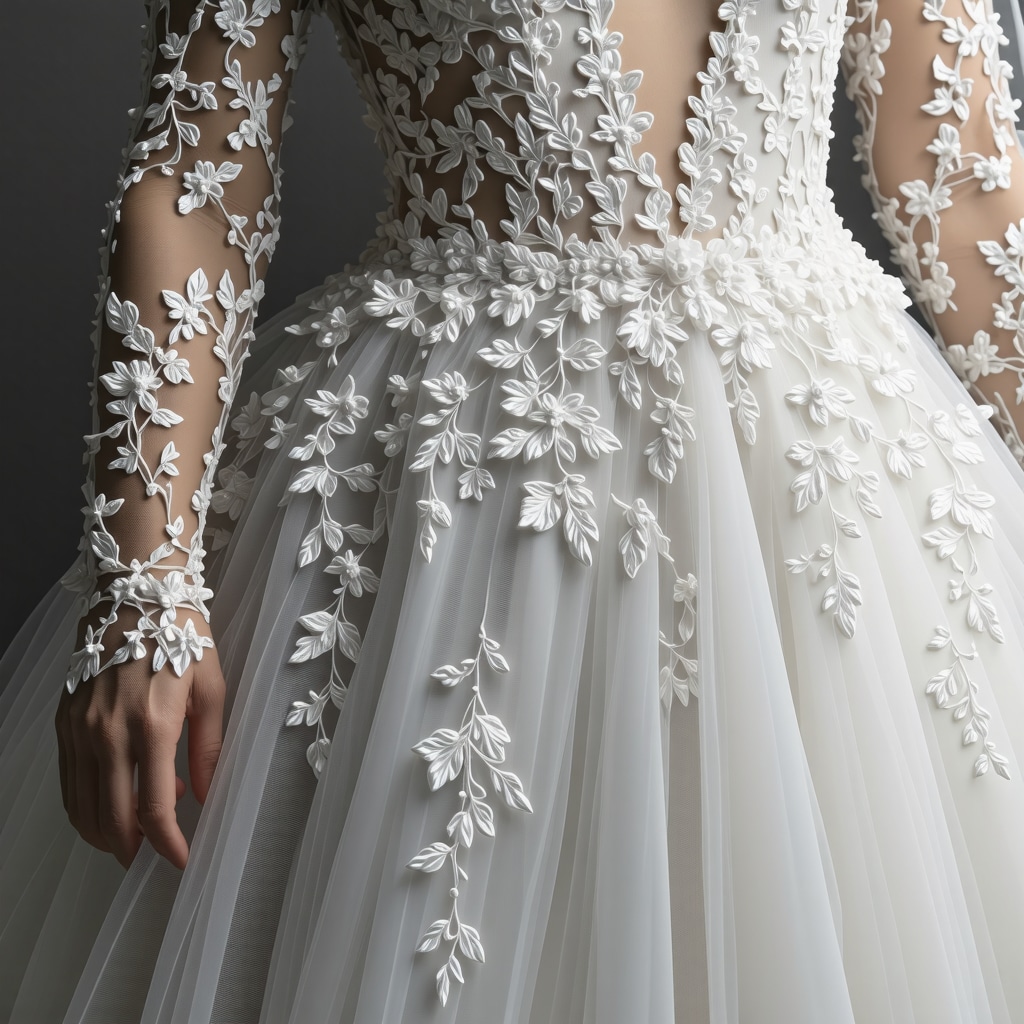Elevating Bridal Preservation Through Organic Cleaning Methodologies
Preserving the pristine condition of a wedding dress transcends mere aesthetics; it embodies safeguarding cherished memories through advanced textile care. Organic wedding dress cleaning employs environmentally responsible techniques that minimize chemical exposure while ensuring fabric integrity and longevity. This approach aligns with the growing demand for sustainable luxury in bridal care, emphasizing safe, plant-based solvents and hypoallergenic solutions.
Advanced Organic Cleaning Agents and Their Impact on Delicate Bridal Fabrics
Traditional dry cleaning solvents, such as perchloroethylene (perc), pose risks including fiber degradation and residual toxicity. In contrast, organic cleaning leverages biodegradable, plant-derived solvents that effectively dissolve stains without compromising delicate lace, silk, or tulle components. These agents maintain molecular fabric structure, preventing micro-damage that accelerates wear. Moreover, the absence of harsh chemicals reduces allergenic reactions, benefiting brides with sensitive skin.
How Does Organic Cleaning Address Complex Stain Removal on Wedding Gowns?
Organic stain removal techniques utilize enzymatic and bio-based formulations tailored to specific stain chemistries—ranging from wine and oil to makeup residues. These treatments are applied with precision, often incorporating low-temperature, water-efficient processes that inhibit dye bleeding and fabric shrinkage. Expert practitioners assess fiber type and weave to customize protocols, ensuring comprehensive stain eradication while preserving gown embellishments and structural integrity.
Integrating Sustainability with Luxury: The Future of Wedding Dress Care
Organic cleaning services exemplify a paradigm shift toward zero-waste garment care by incorporating recyclable packaging and energy-efficient machinery. This holistic methodology supports eco-conscious brides seeking to reduce their carbon footprint without sacrificing garment quality. Facilities offering these services often adhere to strict environmental certifications, reinforcing their authority in sustainable bridal care.
What Professional Standards Ensure Trustworthy Organic Wedding Dress Cleaning?
Leading organic dry cleaners adhere to standards established by textile conservation bodies and sustainable industry frameworks. These include rigorous solvent purity tests, employee training in fabric science, and transparent communication of cleaning processes. Compliance with such standards guarantees both efficacy and safety, fostering consumer confidence in organic wedding dress preservation.
Explore Expert Resources and Elevate Your Bridal Fabric Care
To deepen your understanding of plant-based cleaning solvents and their application in wedding dress maintenance, visit our comprehensive guide on plant-based cleaning solvents for fresh fabrics. Engage with industry thought leaders and share your experiences to contribute to advancing sustainable bridal garment care.
For an authoritative perspective on sustainable textile care, consult the research published by the Textile Institute on environmentally friendly fabric preservation methods: Textile Institute – Environmental Sustainability.
Innovations in Eco-Friendly Textile Preservation for Bridal Wear
As bridal fashion evolves, so do the demands for preserving these delicate garments sustainably without compromising their intricate details or luxurious feel. Innovations in organic cleaning extend beyond solvent selection to incorporate cutting-edge technologies such as ozone treatment and ultrasonic cleaning. These methods enhance stain removal efficacy while maintaining fabric softness and preventing structural fatigue.
Ozone treatment, for instance, serves as a powerful oxidizing agent that breaks down organic contaminants like oils and sweat without relying on harsh chemicals. Similarly, ultrasonic waves gently agitate cleaning solvents, enabling deeper penetration into fabric fibers and lifting embedded dirt without abrasion. These advancements complement plant-based solvents, creating a synergistic approach to eco-friendly bridal garment care.
Can Emerging Technologies Harmonize with Traditional Organic Cleaning to Elevate Wedding Dress Care?
Integrating technological innovations with organic cleaning principles poses exciting opportunities and challenges. While traditional bio-based solvents offer proven safety and environmental benefits, emerging techniques like ozone and ultrasonic processes require careful calibration to avoid unintended fabric stress or color alteration.
Expertise in fabric science and textile conservation becomes paramount in customizing these treatments, ensuring they align with the delicate nature of bridal fabrics such as silk charmeuse, embroidered lace, and hand-beaded tulle. A hybrid approach harnesses the strengths of each method, balancing efficiency with gentleness to preserve heirloom-quality garments for future generations.
Collaborative Industry Standards Driving Sustainable Bridal Care Excellence
Beyond individual practices, the bridal care industry is witnessing increased collaboration among environmental organizations, textile conservators, and dry cleaning professionals to establish robust certification programs. These frameworks emphasize transparency, reproducibility, and continuous improvement in organic cleaning protocols.
For example, the Global Organic Textile Standard (GOTS) extends its remit to endorse cleaning services that adhere to strict ecological and social criteria throughout the garment lifecycle. Dry cleaners accredited under such programs demonstrate commitment to zero hazardous chemical use, water conservation, and safe waste management, reinforcing consumer trust.
Enhancing Client Education for Sustainable Wedding Dress Maintenance
Educating brides and bridal boutiques about the benefits and limitations of organic cleaning fosters informed decision-making and long-term garment preservation. Guidance on proper storage, handling, and routine care complements professional cleaning, reducing the frequency of intensive treatments and extending garment lifespan.
Resources like our detailed guide on organic wedding dress cleaning tips for eco-conscious brides provide actionable advice to maintain fabric integrity and environmental responsibility. Engaging consumers through workshops and transparent communication further builds confidence in sustainable bridal care options.
Leverage Expert Insights: Trusted Research on Sustainable Textile Care
Leading research published in the Journal of Textile Research highlights the efficacy of integrating plant-based solvents with advanced cleaning technologies to optimize stain removal while minimizing environmental impact. This peer-reviewed study emphasizes the need for interdisciplinary approaches combining chemistry, textile science, and sustainability principles.
Join the Sustainable Bridal Care Conversation
We invite you to share your experiences with organic wedding dress cleaning or questions about sustainable garment care practices in the comments below. Your insights help enrich the community’s knowledge and promote eco-friendly bridal preservation. For further reading, explore our comprehensive articles on sustainable garment care protecting luxury wardrobes and eco wedding and formal wear cleaning services in Tampa, where expert advice meets green innovation.
Decoding the Chemistry Behind Bio-Based Solvents in Bridal Fabric Care
Understanding the molecular mechanics of bio-based solvents is crucial for mastering organic wedding dress preservation. These solvents typically consist of esters, alcohols, and terpenes derived from renewable plant materials such as citrus peels and corn. Their amphiphilic nature allows them to surround and dissolve hydrophobic and hydrophilic stains alike, a feat traditional solvents struggle to achieve without damaging delicate fibers.
Moreover, these solvents exhibit low volatility and reduced toxicity, which minimizes environmental emissions and health risks to technicians and clients. Tailoring solvent blends to fabric composition — for instance, optimizing terpene concentration for silk’s proteinaceous fibers versus cellulose-rich cotton blends — enhances cleaning specificity and preserves mechanical properties such as tensile strength and elasticity.
How Do Bio-Based Solvents Interact with Different Textile Fiber Types at a Molecular Level?
Research indicates that the interaction between plant-derived solvents and textile fibers involves reversible hydrogen bonding and van der Waals forces, which facilitate stain detachment without fiber hydrolysis or structural degradation. For example, in silk fibers, bio-based solvents maintain the integrity of the fibroin protein chains by avoiding aggressive pH fluctuations, whereas with cotton, they effectively disrupt lipid-based stains while preserving cellulose crystallinity.
Such nuanced solvent-fiber interactions demand expert knowledge in textile chemistry and analytical techniques like Fourier-transform infrared spectroscopy (FTIR) to monitor molecular changes during cleaning. This scientific rigor ensures that organic cleaning not only achieves aesthetic restoration but also extends the dress’s lifespan.
Harnessing Artificial Intelligence for Customized Organic Cleaning Protocols
The integration of artificial intelligence (AI) into organic cleaning services is revolutionizing personalized bridal gown care. Machine learning algorithms analyze high-resolution images and fabric composition data to identify stain types and fabric vulnerabilities, subsequently recommending optimal bio-based solvent formulations and treatment durations.
Such AI-driven precision reduces trial-and-error, mitigates risk of overexposure to cleaning agents, and optimizes resource consumption. Additionally, predictive maintenance models can forecast when a gown may require subsequent cleaning or preservation interventions based on environmental exposure and storage conditions, offering proactive garment care.
Can AI Algorithms Replace Expert Textile Conservators in Organic Wedding Dress Cleaning?
While AI enhances diagnostic accuracy and protocol customization, it cannot wholly supplant the nuanced judgment of textile conservators. Human expertise remains indispensable for interpreting AI outputs within the broader context of bridal gown history, embellishment complexity, and sentimental value. Instead, AI serves as a complementary tool, augmenting conservators’ decision-making with data-driven insights and reducing human error.
Advancing Industry Certifications: Toward a Global Standard for Organic Bridal Cleaning
Efforts are underway to harmonize organic bridal cleaning certifications internationally, enabling consistent quality benchmarks and environmental accountability. The proposed framework integrates chemical safety assessments, lifecycle analyses of cleaning materials, and social compliance audits addressing worker health and fair labor practices.
Such comprehensive certification schemes incentivize innovation in eco-friendly solvent development and process optimization. They also reassure brides worldwide that their treasured garments receive care aligned with the highest sustainability and conservation principles.
Which Organizations Are Leading the Development of Universal Standards in Organic Bridal Care?
Institutions like the International Association for Textile Care (IATC) and the Sustainable Textile Alliance (STA) spearhead these initiatives, collaborating with environmental NGOs and governmental agencies. Their joint publications and white papers outline multi-dimensional criteria and auditing protocols, fostering transparency and continuous improvement.
Engage with the Cutting Edge of Sustainable Bridal Fabric Preservation
To explore the latest advancements in bio-based solvent chemistry and AI-assisted cleaning methods, consider joining professional forums such as the International Association for Textile Care or subscribing to journals like Textile Chemistry and Conservation. Connecting with experts and contributing to ongoing research can elevate your bridal garment care practice to unparalleled levels of sustainability and sophistication.
We encourage you to share your experiences or inquiries about combining advanced technologies with organic cleaning in the comments section below. Together, we can pioneer the future of eco-conscious bridal preservation.

Delving into Molecular Innovations: The Next Frontier of Organic Bridal Care
Recent breakthroughs in bio-based solvent engineering have expanded the toolkit for organic wedding dress preservation, introducing tailored solvent blends designed to interact selectively with specific textile fibers and embellishments. These sophisticated formulations employ molecular encapsulation and controlled-release mechanisms to optimize stain dissolution while minimizing solvent exposure duration, thereby enhancing fabric longevity. Such precision chemistry ensures that even the most fragile hand-embroidered motifs and vintage lace maintain their structural and aesthetic integrity over time.
Synergistic Effects of Combined Organic and Physical Cleaning Modalities
Innovative protocols now integrate enzymatic bio-cleaning with emerging physical treatments such as low-frequency ultrasonics and controlled ozone exposure. This multimodal strategy leverages the biochemical specificity of enzymes with the mechanical and oxidative advantages of physical agents, achieving superior removal of complex, multi-component stains like aged lipstick or layered soils. Crucially, process parameters are continuously monitored via spectroscopic and thermal sensors to avert any detrimental impact on fiber crystallinity or dye fastness.
How Are Advanced Sensor Technologies Revolutionizing Organic Cleaning Quality Control?
State-of-the-art sensor arrays utilizing near-infrared (NIR) and Raman spectroscopy enable real-time, non-destructive monitoring of fabric condition and solvent interactions during the cleaning process. These technologies facilitate immediate adjustments in solvent composition, temperature, and exposure time, ensuring a dynamic response tailored to each garment’s unique textile architecture. The integration of such analytical instrumentation elevates organic cleaning from a primarily manual art to a data-driven science, substantially reducing risk and improving reproducibility.
Bridging Sustainability with Circular Economy Principles in Bridal Textile Care
Leading organic dry cleaning services are pioneering circular economy models by reclaiming and recycling bio-based solvents and employing closed-loop water treatment systems. These initiatives minimize waste generation and resource consumption, aligning with global sustainability mandates. Additionally, partnerships with fabric recycling programs enable end-of-life bridal gowns to be repurposed responsibly, transforming once cherished garments into new textile products or insulation materials, thereby extending their environmental value.
Collaborative Research and Standards Development for Elevated Organic Bridal Care
Ongoing collaborations between textile chemists, conservationists, and environmental scientists have culminated in the formulation of advanced standards under the auspices of the International Textile Care Council (ITCC). These standards emphasize stringent ecological impact assessments, solvent biodegradability metrics, and comprehensive lifecycle analyses. The ITCC’s white paper Organic Cleaning Standards 2024 provides an authoritative framework guiding practitioners towards best practices and innovation adoption.
Engage with the Frontier: Unlock Expert-Level Sustainable Bridal Fabric Preservation
To fully leverage these cutting-edge methodologies and standards, bridal care professionals and eco-conscious brides are encouraged to participate in specialized workshops and certification programs offered by the International Textile Care Council. Share your insights, inquire about specific fabric challenges, or discuss integration of AI and sensor technologies in organic cleaning through our expert-led forums and webinars. Embracing these advancements ensures your bridal gown receives unparalleled, sustainable care that honors both heritage and innovation.

Expert Insights & Advanced Considerations
Integrating Sensor Technologies Elevates Process Precision
The deployment of near-infrared (NIR) and Raman spectroscopy sensors in organic wedding dress cleaning introduces unprecedented real-time monitoring capabilities. This allows dynamic adjustment of solvent composition and exposure parameters, thus safeguarding delicate fibers from degradation while maximizing stain removal efficacy.
Synergistic Application of Enzymatic and Physical Modalities
Combining bio-enzymatic treatments with low-frequency ultrasonic and controlled ozone technologies creates a multimodal cleaning approach. This synergy enhances removal of complex, layered stains while maintaining fabric softness and structural integrity, representing a new benchmark in sustainable bridal fabric care.
Artificial Intelligence as a Complementary Expert Tool
AI-driven diagnostics optimize solvent selection and treatment protocols by analyzing fabric composition and stain typology. However, expert conservator oversight remains essential to contextualize AI recommendations, ensuring heritage fabrics and embellishments receive tailored, nuanced care.
Global Certification Harmonization Bolsters Consumer Trust
Efforts by organizations such as the International Association for Textile Care (IATC) to unify organic bridal cleaning standards enhance environmental accountability and quality assurance. Such frameworks encourage innovation and transparency, directly benefiting brides seeking sustainable preservation solutions.
Circular Economy Principles Enhance Environmental Impact Mitigation
Closed-loop solvent recycling and water treatment systems, alongside responsible gown end-of-life programs, exemplify how organic dry cleaners can embed circularity in their operations. This holistic sustainability approach aligns with evolving consumer expectations and regulatory trends.
Curated Expert Resources
International Textile Care Council (ITCC) – Organic Cleaning Standards 2024: This authoritative white paper details ecological impact assessments and lifecycle analyses critical for practitioners committed to best-in-class organic bridal care. See: Organic Cleaning Standards 2024.
Journal of Textile Research: Renowned for its peer-reviewed studies, this journal provides insights into solvent-fiber molecular interactions and sustainable cleaning methodologies, essential for advancing organic fabric care expertise. Explore more at Journal of Textile Research.
International Association for Textile Care (IATC): A global forum fostering collaboration on textile care innovations, certifications, and environmental standards. Membership offers access to cutting-edge research and professional development opportunities. Visit IATC.
EcoDryCleaningFlorida.online – Plant-Based Cleaning Solvents: A practical guide for understanding the chemistry and application of bio-based solvents in bridal fabric care. Valuable for professionals and eco-conscious brides alike. Read at Plant-Based Cleaning Solvents for Fresh Fabrics.
EcoDryCleaningFlorida.online – Organic Wedding Dress Cleaning Tips for Eco-Conscious Brides: Offers actionable advice for maintaining gown integrity and environmental responsibility post-cleaning. Accessible and detailed, it complements professional services. See Organic Wedding Dress Cleaning Tips.
Final Expert Perspective
The trajectory of organic wedding dress cleaning is decisively shaped by the convergence of advanced sensor technologies, enzymatic-physical treatment synergies, AI-enhanced diagnostics, and rigorous global certification standards. These elements collectively elevate sustainable bridal fabric care from artisanal practice to a sophisticated science, ensuring that treasured garments retain their pristine condition and heritage value for generations.
Embracing circular economy principles further solidifies the environmental stewardship role of organic dry cleaning, aligning industry innovation with growing ecological imperatives.
For professionals and discerning brides alike, the evolving landscape presents both challenges and opportunities to engage deeply with cutting-edge methodologies and trusted resources. We invite you to advance this dialogue by sharing your professional insights, exploring recommended expert materials, and participating in specialized forums such as the International Association for Textile Care.
To explore more about sustainable bridal fabric care and discover tailored cleaning solutions, visit our detailed guide on plant-based cleaning solvents for fresh fabrics and learn how to protect your cherished garments with expert care.

